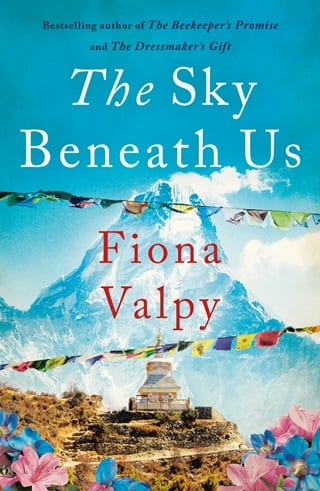Violet’s Journal
S ATURDAY , 30 TH M AY , 1953
The inevitable has happened at last. Word has just reached us that two men have stood on the summit of Mount Everest. One is a Sherpa, Tenzing Norgay, from the village of Thame, just one day’s walk from here, close by the monastery at Thamo where I spent those months with Colonel Fairbairn’s expedition. The other is a man called Edmund Hillary and he’s travelled halfway round the world to conquer the mountain. So, on a day when a new Queen was about to be crowned in Britain, the Mother Goddess of the Himalaya surrendered her own crown.
There’s much talk in Phortse about what this will mean. To stand on the head of the deity is an act of disrespect. Yet it’s also focused the eyes of the world on this remote corner of the planet and opened up new opportunities for the Sherpa people. The Nepali government has finally opened the country to mountaineers and tourists and with the conquering of Everest the floodgates will surely open.
The day we heard the news, the entire village filed up to the monastery to pray and offer their respects to Chomolungma, hoping to appease the goddess and rebalance the karma . Themi and I joined them for the ceremony and as I sat cross-legged on the floor, I sensed something new in the air: a tangible sense of hope, mingled with the smoke from the incense and the sound of the rapidly chanted prayers. In the fields and the teahouses, the men talk of the money they can earn from guiding, whilst the women’s eyes fill with worry. And I ponder what it might mean for Themi and me, this opening up of our sanctuary to the world.
The safety and freedom I’ve known here have come at a price. After Hetty died, my source of income from the sale of my seeds and paintings dried up. To make ends meet, I’ve had to sell salt, which the men mine from deposits in the mountains. It involves lugging the heavy bags all the way to Lukla and going door to door. Themi is my secret weapon – one look at her rosy cheeks and glowing hazel eyes makes every householder smile and forget to barter down the price I’m asking. She never complains when we have to make the arduous week-long journey and is good company as she trudges the dusty path beside me, carrying our little bundle of supplies. I won’t let her carry the salt. It’s far too heavy. It twists my bones and makes every muscle in my body ache, but it’s worth it when we return, feeling a great deal lighter in heart and mind, with a roll of rupees tucked safely into the pocket of my apron.
At night, as I huddle beneath the blankets for warmth and stare up at the soot-caked roof of our hut, I question again whether staying on is the right decision. The thought of my childhood home with its comfortable furnishings, electric lights and water on tap brings simultaneous pangs of longing and guilt. I’ve deprived my daughter of so much. But then I listen to Themi’s soft breaths as she sleeps and I think of what I’ve given her: the freedom to discover who she really is, unfettered by social constraint; the strength to live on her own terms, rather than those imposed by others; the innate confidence that comes from being part of this community where non-judgemental acceptance and unconditional affection are taken as givens.
I ease my aching back as I turn over, cocooning myself more tightly in the layers of woollen covers as I watch the crescent moon sail above Khumbila’s summit in its sea of stars. And I decide we should stay a little longer, at least one more summer, just until this year’s harvest is in ...
 Fullepub
Fullepub 



